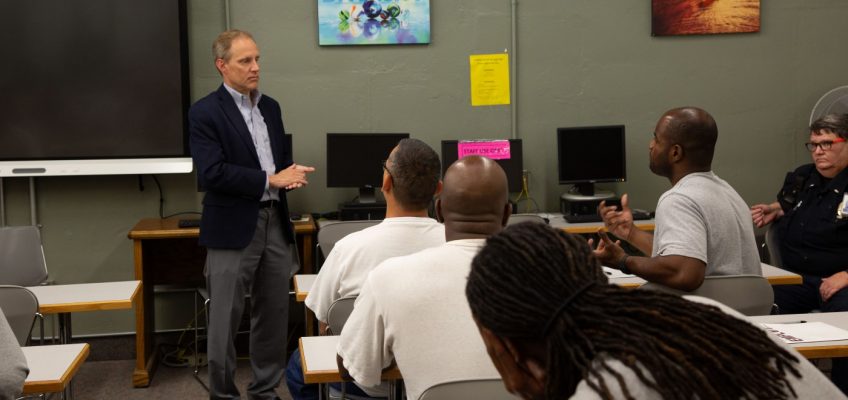Addressing a classroom of inmates in Lino Lakes on Thursday, Minnesota Secretary of State Steve Simon acknowledged voting might not be the first thing on a person’s mind at the end of their incarceration.
But the group of 20 or so men serving the final years or months of their sentences had plenty of questions for the state’s top election official. Simon has been touring state prisons to spread the word about a relatively new state law restoring voting rights to felons on supervised release.
The men’s questions ranged from how to find what’s on their ballots to how to push for changes to state law, and whether having a felony disqualifies someone from running for office.
The answer to that last question? No, said Simon, which was followed by a quip from the audience about current GOP presidential nominee former President Donald Trump.
“You can run for anything you want,” the inmate said, referring to Trump’s numerous felony indictments and recent conviction. “The presidential nominee has 34 felonies.”
Simon’s visit to Minnesota Correctional Facility-Lino Lakes this week was his seventh stop on a statewide prison tour aimed at educating and dispelling misinformation about a law restoring voting rights to more than 55,000 Minnesotans.
Despite felons on supervised release being able to vote in Minnesota elections since June 2023, Simon said there still is some confusion following a 20-year debate in the Minnesota Legislature and challenges in the state’s courts. Raising the stakes is it being a presidential election year, which means much higher interest and voter turnout.
Getting the word out
Minnesota Secretary of State Steve Simon, center, tours the Minnesota Correctional Facility in Lino Lakes with warden Shannon Reimann, right, on Thursday, July 25, 2024. Simon spoke to inmates nearing the ends of their sentences about Minnesota’s new law restoring the right to vote for those with felony convictions who are no longer incarcerated. (Devanie Andre / Pioneer Press)
“I think half the battle here is just getting the word out that this is even a thing,” Simon said in an interview at the end of his prison visit. “I want to make sure everyone understands their rights. As I said in there, they have the right to vote or not to vote, but I wouldn’t want anyone confused into not voting.”
There also have been legal challenges to the law, which the Attorney General’s office, led by Democrat Keith Ellison, and Simon, also a Democrat, say spread uncertainty about felon voting rights.
The Conservative group Minnesota Voters Alliance filed a lawsuit in Anoka County that the state Supreme Court heard in April. A decision still is pending, but the law remains in place. Separately, a Mille Lacs County judge declared the law unconstitutional and tried to bar several people on probation from voting, but the state appeals court overruled him.
Lino Lakes holds more than 1,000 prisoners, and while only around 20 saw Simon Thursday, word about the change will spread, said Kelly Haff, a legislative director with the Department of Corrections.
People serving time can’t vote in Minnesota — so for someone serving a decades-long sentence at a maximum security facility like Stillwater, information on voting won’t be useful for a long time. At Lino Lakes, a medium-security prison, many are preparing to get released in just a few years.
The facility focuses on helping inmates with substance use problems, rehabilitating sex offenders and preparing people for life on the outside through educational and vocational programs. Corrections department officials say 80% are in some kind of treatment program.
Simon said he’s fielded many questions about politics and government from people incarcerated at Minnesota prisons, but at Lino Lakes, he noticed a particular interest in advocacy and the law-making process. Many in the classroom had questions about the lawmaking process and how to go about changing policy.
The Secretary of State’s prison tour continues next week with a visit to Minnesota Correctional Facility–Togo in Itasca County.
Minnesota is one of 23 states that automatically restore voting rights upon release. Washington, D.C., Maine and Vermont allow incarcerated people to vote.
Related Articles
Gov. Walz, other top Minnesota Democrats line up to support Kamala Harris for president
Amy Klobuchar, Tina Smith, Angie Craig react to Biden’s exit
‘A place of choice and opportunity’: An interview with Mayor Melvin Carter on the future of downtown St. Paul
U.S. Rep. Betty McCollum joins calls for Biden to drop out of presidential race
Royce White, Joe Fraser present contrasting conservative visions in first Senate debate


Leave a Reply